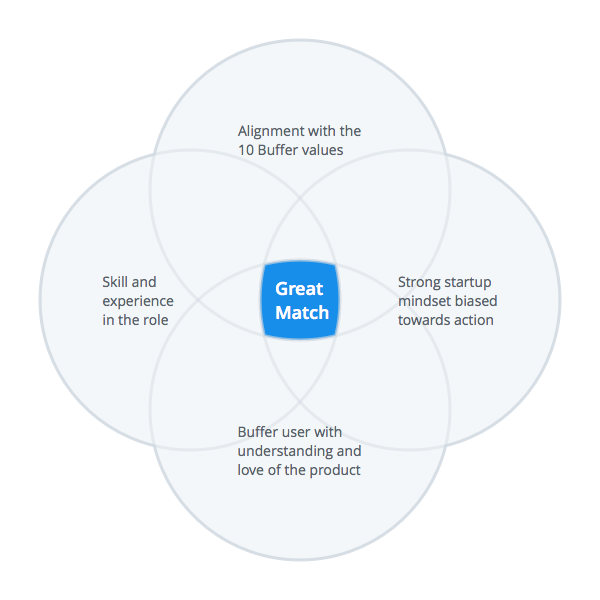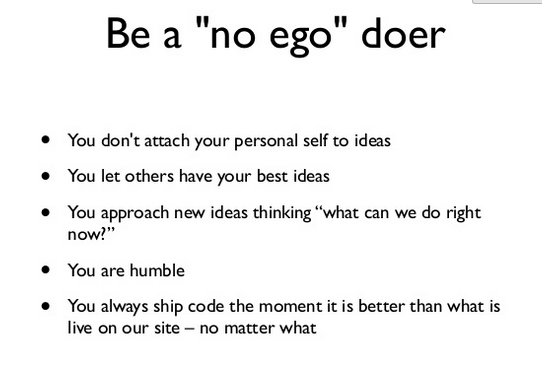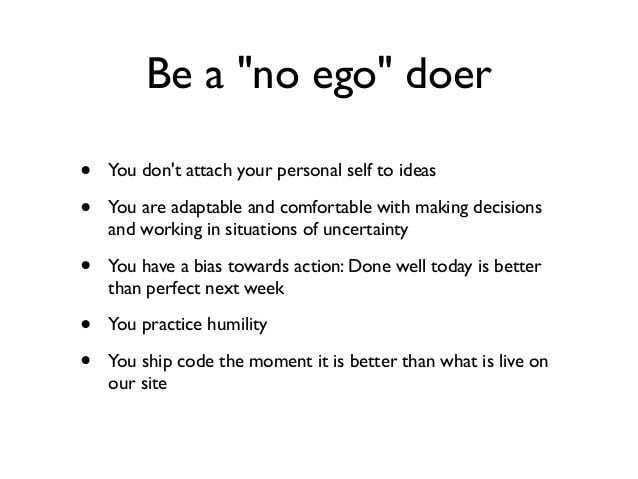What does it mean to have a “startup mindset”?
We’ve always tried to offer as much insight as we can into how we hire at Buffer. With Buffer’s core value of transparency, it feels like the right thing to do.
In the past, we’ve often shared this diagram with teammates working in hiring and with potential candidates, showing the four main components that we’ve grown to believe make for a great fit at our startup.

Lately we’ve been giving the “strong startup mindset biased toward action” quadrant a hard look to see if we could become more clear and explicit about what exactly we’re looking for, and why.
Implicitly, we’ve always valued doers and makers at Buffer, as well as moving fast, occasionally breaking things and asking for forgiveness instead of permission. Internally (and fairly un-grammatically) we often call this factor “startupyness.”
It all goes back to something our teammate Steven said once that we all really related to:
“Being a part of a startup is like trying to build a bike while riding it.”
The “startup” factor was missing from our values
Other tech companies like Facebook have done an awesome job at making this factor a very explicitly stated element of their values:

Speed and adaptability are crucial factors for us, too: We all try to be fluid and adapt to any challenges that come our way.
But we’ve never quite had this “startup” factor truly reflected in our values—here’s a look at how they were written until very recently:
As a result, we have often found ourselves providing feedback to those in the Buffer bootcamp to to try and move towards action quickly instead of lingering too long on reading up or trying to understand everything about the Buffer culture from the get-go.
In hindsight, this must have been a bit tough for them to understand, since this philosophy was more of an implicit understanding that wasn’t written into our values or much of anywhere else outside the above diagram.
So what does it mean to be startupy?
As a result, we decided to make a new change to our always-evolving Buffer values to make this element of our culture more explicit.
But first, it was important to understand what we’re talking about when we talk about startupyness, or a startup mindset. Do we mean only people who have previously worked at startups? Or all people who are willing to move fast, fail, and learn from it?
Now that we’re self-managed, it’s become more important than ever to be explicit about self-direction, initiative and moving fast.
Here are some of the bullet points we considered for a potential “startupy” value:
- When an existing solution exists, you consider choosing it over reinventing the wheel
- You are mindful of time, not only your own but also how it impacts customers & team members
- You prefer sensing & reacting over predicting & controlling
- You are easily able to adapt to change
- You tend to ask for forgiveness, rather than permission
Can you move fast and still be reflective?
Another big question for us was how a value of “moving fast” would counterbalance with our value of reflection. Were they paradoxical, or could these two work together?
We’d like to strive for both, and Niel reminded us of a perfect example that shows how the two can live in harmony together.
“The 5 Whys process is perhaps a perfect example of how these two values could be mutually beneficial. The reflection creates changes in processes to keep our momentum and lean nature.”
“Bias toward action” > Startupiness
One thing that felt very important for us to keep front-of-mind is that you don’t need startup experience to have a mindset that will work great at a startup.
Anyone can be biased toward action and excited about moving fast, and calling this trait “startupyness” or even including the word” startup” in this value could have had the effect of alienating some candidates who might have otherwise been a great fit.
One of our super thoughtful commenters explained it really well in a comment about the top diagram:
“What I find interesting is that a great match is one who has a “strong startup mindset biased towards action.” I would caution to not be so biased towards candidates who’ve never worked at startups. It’s a catch-22 when you expect someone to have startup experience before allowing them to work at your startup. And you don’t need a startup mindset to be biased towards action. Asking for this means that Buffer runs the risk of turning down a great match because they don’t have the same background as Buffer employees. This could also speak towards and address the lack of diversity in Buffer and many other startups.”
Keeping this in mind, it felt great to focus on the underlying mentality behind moving fast, rather than the word “startup” itself.
Our new values, now with “bias toward action”
A glimmer of our focus on action could possibly be reflected in many of our existing values, from “live smarter, not harder” to “no ego doer,” but none of them quite spelled it out as plainly as we wanted.
In the spirit of moving fast, we decided to modify our existing value of “Be a ‘no ego’ doer” to create more of an explicit definition of the moving fast mindset we think works best at Buffer.
Here’s a look:
Old “no ego doer” value

New “no ego doer value”

Essentially, these two lines are new:
- You are adaptable and comfortable with making decisions and working in situations of uncertainty
- You have a bias towards action: Done well today is better than perfect next week
Leo was instrumental in bringing this change about, and here’s how he described it:
“What this new value change means to me is that we’re trying our best to move beyond the many small moments of uncertainty and doubt that we might feel when working on something to instead doing our best to provide more value to our customers as soon as possible. Starting experiments to learn and iterate quickly and making changes with confidence even if they seem tough at times. I feel that we’re doing a lot of these things already and I’m excited to make it more explicit in our values.”
Over to you!
We hope this change to our values will help anyone looking in from the outside understand our way of doing things a bit better and also guide us in our own hiring and feedback decisions a bit more clearly.
We’d love to hear from you have if you have any thoughts on how this change makes you feel!
Try Buffer for free
190,000+ creators, small businesses, and marketers use Buffer to grow their audiences every month.



